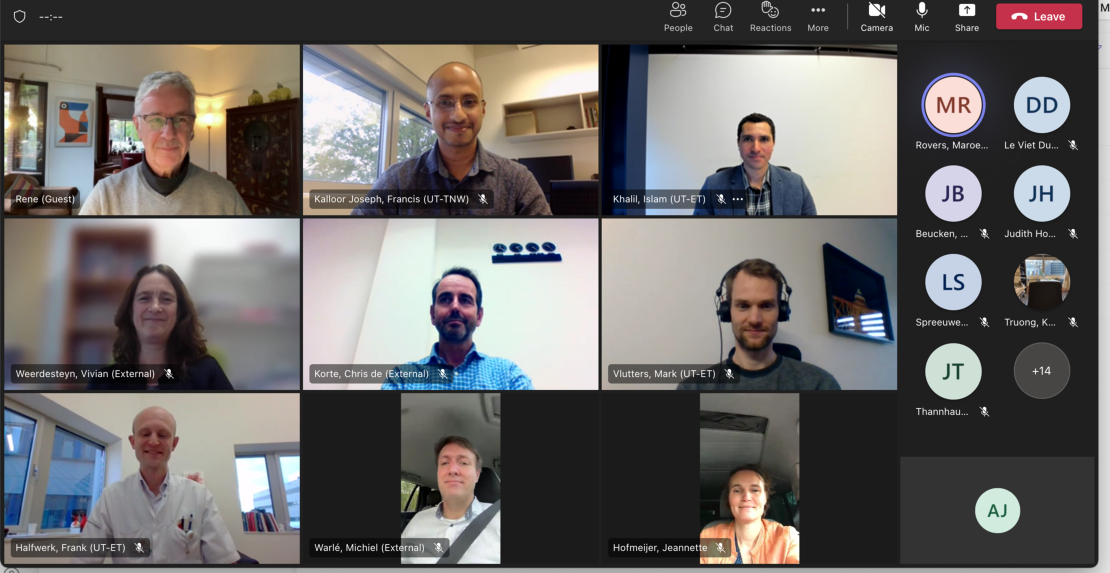Four TURBO grants were awarded today to researchers of the University of Twente (TechMed Centre) and RadboudUMC for innovative research into medical technology. The grants will enable the researchers to jointly develop their innovative idea and pursue follow-up funding.
Treating blood clot formation with microbots
Project title: Navigable Active Treatment of Acute Limb Ischemia – NATALI
Islam Khalil (UT) en Michiel Warlé (Radboudumc)
Peripheral artery disease can cause blood clot formation in the bloodstream, which can lead to ischaemia, (lower) leg amputation, or sometimes even death. Khalil and Warlé are investigating a promising treatment for this clinical problem; namely microbots. These tiny, wireless microbots can be introduced into the bloodstream, where they can destroy the blood clots. To do this, the microbots have to swim against the blood flow, under the influence of a magnetic field. The RUMC and the UT will combine their respective clinical and technological expertise to test the microbots using in vitro and ex vivo models of thrombosis, thus demonstrating in a first proof-of-concept study that microbots are the way to go to achieve revascularization wirelessly.
Acoustic imaging to optimize oral tumour treatment
Project title: Acoustic Imaging-based Fast Resection Margin Assessment for Oral Oncological Surgery
Francis Kalloor Joseph (UT) en Chris de Korte (Radboudumc)
In 2020 alone, there were 377,000 cases of oral squamous cell cancer (OSCC) worldwide. About 30% of patients with this cancer die from the disease and the majority of patients also suffer severe morbidity. The usual treatment is surgical resection of the tumour. Given the location of OSCC, the area removed should be as minimal as possible to preserve functional tissue. However, due to the lack of imaging during surgery, the tumour margins can often not be sufficiently determined, with the result that patients have to follow additional treatment, such as an extra surgery or radiation. Histological examination shows that quantification of OSCC vascularity can help determine tumour margins. In this project, Kalloor Joseph and De Korte investigate whether both structural and functional information of the OSCC tumour can be obtained with the combination of photoacoustic imaging and ultrasound. This should lead to more accurate surgical interventions and optimal treatment for patients with as little collateral damage as possible.
Predicting recovery of comatose patients after cardiac arrest
Project title: Modelling Individual Coma RecOvery and Neurological outcome – MICRON
Jeannette Hofmeijer (UT) en Rick Helmich (Radboudumc)
Brain damage after cardiac arrest is a common cause of coma. Unfortunately, about half of the patients who suffer from brain damage after a cardiac arrest never regain consciousness. More insight into the nature and severity of brain damage should allow targeted treatment, including treatment discontinuation, in patients whose brain damage is too severe. At present, however, the extent of brain damage per patient is unknown and prediction of outcome is reliable in only half of the patients. This project aims to create a breakthrough in the prediction of the recovery of all individual comatose patients after cardiac arrest. To achieve this, Hofmeijer and Helmich will combine their expertise in electrophysiological features of coma and novel MRI measurements of brain structure and function. This will lay the foundation for building ambitious multimodal models for personalized outcome prediction and treatment of comatose patients after cardiac arrest.
Monitoring Parkinson’s disease with digital biomarker
Project title: Towards a digital biomarker for postural instability in Parkinson’s disease
Mark Vlutters (UT) en Vivian Weerdesteyn (Radboudumc)
Parkinson's disease is the fastest-growing neurological disorder worldwide. A major complication of this disease is instability, resulting in falling, fall-related injuries and patients’ loss of independence. Reliable and objective assessment of postural instability is crucial for measuring disease progression and tailoring personalized treatment. However, the current golden standard (manually knocking over a patient) is too variable in performance and subjective in evaluation. Vlutters and Weerdesteyn, therefore, strive to develop a user-friendly clinical tensile test that is both standardized and objective. By using a digital biomarker for rebalancing, they want to develop a new clinical test standard for monitoring Parkinson's disease. Figure 1: The online award ceremony
Figure 1: The online award ceremony
About TURBO
The TURBO program started in 2017 and is an acronym for 'Twente University Radboudumc Opportunities.' It ties in with the TOPFIT program, which gives further effect to the ‘Concepts for a Healthy Life' innovation profile of the East region in the Netherlands. The purpose of a TURBO grant is to prepare a project for acquiring larger, external funding, such as those provided by national and European funds and companies that are active in the field of health care and technology.





